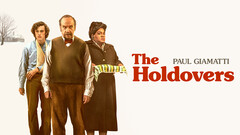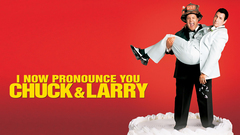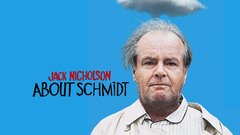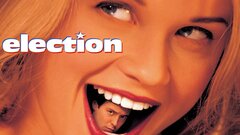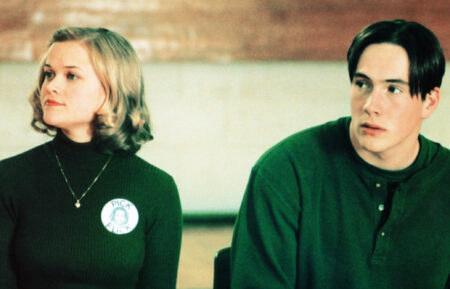Throughout his critically acclaimed career, writer-director Alexander Payne has shown a remarkably poignant vision with his films, in which the often quirky set-up was merely a launching point for a seriocomic exploration into human foibles. With "Citizen Ruth" (1996), Payne examined the gravely serious issue of reproductive rights, an unlikely subject for what turned out to be an adroit satire that managed to both present and rankle both sides of the issue. For his next film, "Election" (1999), he used a seemingly inconsequential high school presidential race to plumb the darkest recesses of our mutable human nature.
Then there was "About Schmidt" (2002), which used a cross-country journey to depict an anchorless average man trying to make sense of his life. But Payne - alongside longtime writing partner Jim Taylor - had perhaps his greatest critical success with "Sideways" (2004), an excursion into wine country that explored the unlikely friendship of two men struggling with their perceived failures. "Sideways" earned Payne numerous accolades, including an Academy Award for Best Screenplay. His critically acclaimed drama "The Descendants" (2011) also earned rave reviews and its director another Best Screenplay Oscar, all of which helped cement his reputation as a visionary filmmaker adept at making unflinching films depicting the more uncomfortable aspects of human nature.
Born on Feb. 10, 1961 in Omaha, NE, Payne - whose grandfather Anglicized their Greek name Papadopoulos - was raised by his father, George, a restaurateur who owned the Virginia Café, and his mother, Peggy. He began his filmmaking journey to filmmaking in the early 1960s when his father received an 8mm camera from Kraft Foods as a bonus for being a good customer, which Payne used to make his own amateur films that he edited inside the camera. Following his graduation from Creighton Preparatory School, an all-male Jesuit high school, he earned his bachelor's in both history and Spanish literature at Stanford University. In 1984, Payne enrolled at the University of California at Los Angeles to study film, where his hour-long thesis film, "The Passion of Martin" (1989), earned him rave reviews and industry attention.
The story of an alienated still photographer who falls in love, "The Passion of Martin" secured Payne a spot at the Sundance Film Festival and ultimately landed him a job at Universal Pictures, where he spent several years writing an unproduced script called "The Coward." Still, the three-year deal gave the young Payne plenty of money to live on. While "The Passion of Martin" worked its way around the festival circuit, Payne completed several shorts produced by Propaganda Films that wound up being shown on the Playboy Channel. Unfortunately at this point, the buzz surrounding his student film was fading and the director was no longer a hot commodity.
Though he received an offer to directed "Romeo Is Bleeding" (1994), Payne turned down the job based on what he thought was a weak script. In 1992, Payne and then roommate, Jim Taylor, took an interest in the increasingly heated abortion debate after reading several newspaper accounts. Noting the myriad possibilities for a film exploring the personalities behind the opposing sides, the two collaborated on a script that eventually became "Citizen Ruth" (1996). Laura Dern was cast as the titular dim drifter addicted to chemical inhalants who suddenly finds herself pregnant. Faced with Ruth's vagrancy, unapologetic drug use and pregnancy, a judge charges her with felony child endangerment with the condition that terminating her pregnancy will erase the charges. The case grabs the attention of the pro-life camp which seeks to save Ruth and her unborn child, while pro-choice activists attempt to rescue her. A sly satire, "Citizen Ruth" skewered both sides' hypocrisy with skillful even-handedness, turning the movie into a statement about personal freedom rather than taking a position on reproductive rights. Winning rave notices from critics, the film was touted for its offbeat humor as well as its courageous unconventionality.
Both Payne and Taylor reunited to adapt Tom Perrotta's novel into "Election" (1999), a sharp political satire centered around a high school election, even though the story was originally inspired by the 1992 presidential campaign. Shifting the setting from Perrotta's New Jersey to his own hometown of Omaha, Payne adroitly cast seasoned professionals like Matthew Broderick, who played Jack McAllister, a withered, but well-respected high school teacher whose ideals are insulted when the annoyingly perky Tracy Flick (Reese Witherspoon) runs unopposed for student body president. So McAllister enlists a dumb, but popular football star, Paul, (Chris Klein) to run against Tracy, only to have Paul's lovelorn sister, Tammy (Jessica Campbell), jump into the race as well. Despite the high school setting, Payne managed to paint a picture less about politics than the dark side of human nature and the mutable role of ethics in society. Regardless of the satirical undercurrent, Paramount marketed "Election" as just another teen movie, even though it was anything but. Almost universally hailed by critics, the film was by far one of the smartest and most transcendent youth-oriented films of its era. "Election" also earned Payne and Taylor numerous accolades, including an Academy Award nomination for Best Adapted Screenplay.
After Payne and Taylor shared writing credit with a list of other top writers on "Jurassic Park III" (2001), their next film, "About Schmidt" (2002), delivered on the promise of their earlier efforts. Depicting not a typical movie hero or even an antihero, but a normal, average American in the form of 66-year-old Warren Schmidt (Jack Nicholson), "About Schmidt" told the story of a man who, after the death of his distant wife (June Squibb) of 42 years, sets out on a journey to find his daughter (Hope Davis), who is about to marry a dolt (Dermot Mulroney) he considers unworthy of her. Intending to stop the marriage, he finds his plans going awry when he meets the dolt's extroverted mother (Kathy Bates), whose bold free-spiritedness rattles the typically staid Schmidt to his core. Although rife with comedic moments, the film also unflinchingly charted into serious territory and generated intense critical fanfare, particularly for Nicholson and Bates, with the former delivering one of his most restrained performances in decades.
In the wake of "Schmidt's" immense critical success, which included a Golden Globe win for Best Screenplay, Payne continued to focus on smaller, more personal films. Not only was the director able to continue to lure terrific actors, he allowed audiences to discover the depth of talent these actors possessed but that may have previously been overlooked. Payne took a huge leap forward with his next film, "Sideways" (2004), which he and Taylor adapted from Rex Pickett's novel of the same name. Widely praised and easily the best-reviewed film of that year, "Sideways" followed struggling and mildly depressed author, Miles Raymond (Paul Giamatti), who takes his actor best friend, Jack (Thomas Hayden Church), to wine country to celebrate the latter's last days as a bachelor.
While Miles intends to show Jack the finer points of drinking wine, Jack wants to sow his oats in a last-ditch effort to enjoy his bachelorhood. Along the way, the divorced Miles is pushed by Jack to romantically pursue waitress Maya (Virginia Madsen), while himself going after Maya's friend, Stephanie (Sandra Oh). Hilariously funny and touchingly human, "Sideways" splendidly reflected the possibilities of even the most down-and-out to have a second chance at life. Widely hailed by critics and receiving many accolades, the film earned Payne and Taylor an Academy Award for Best Adapted Screenplay, while actually having a surprising effect on wine sales. Despite the enormous success of "Sideways," Payne suffered a personal setback when he and wife Sandra Oh split in 2005, while finalizing their divorce two years later.
Meanwhile, the writing partners penned a draft of the Adam Sandler-Kevin James comedy "I Now Pronounce You Chuck and Larry" (2007) before Payne broke out into television to direct and executive produce on "Hung" (HBO, 2009-11). Returning to film, he directed "The Descendants" (2011), which starred George Clooney as a rich widower who takes his two rebellious daughters on a mission to find his dead wife's lover. The film went on to win a Golden Globe as Best Motion Picture before earning five Academy Award nominations, including nods for Payne in the writing, directing, and Best Picture categories. Shut out by the silent movie ode "The Artist" (2011), "The Descendants" garnered Payne and co-writers Nat Faxon & Jim Rash an Oscar for Best Adapted Screenplay.

